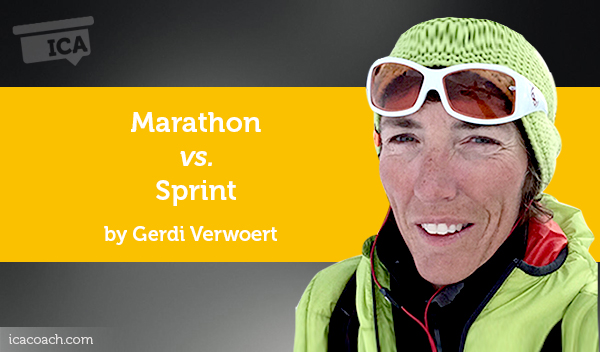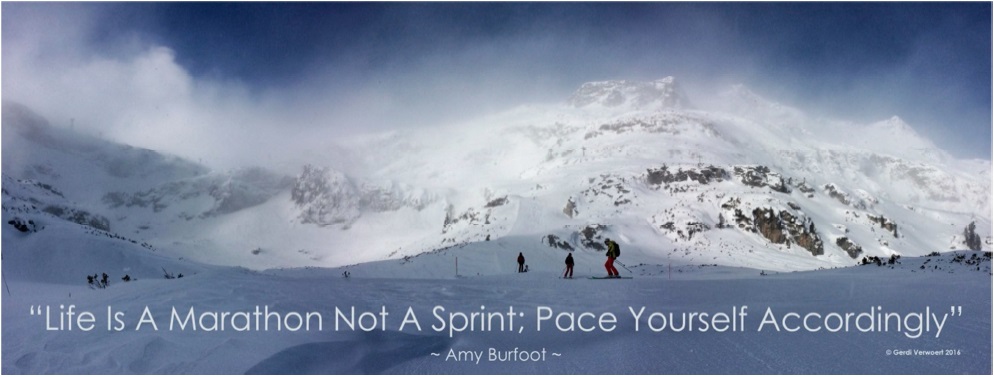
A Coaching Power Tool Created by Gerdi Verwoert
(Life Coach, AUSTRIA)

The Case
Though winter has cleared the way for spring not quite yet, I recently started training to get ready for the summer season. As a coach who likes to offer her clients the opportunity to have a deep and potentially life altering experience by not just coaching them but by coaching them and taking them into the mountains while doing so, I feel it is necessary to not just be in the best possible mental shape, but also be so in the physical sense.
So one early Thursday morning I find myself at the foot of a pristine snow covered mountain slope. There are nothing but animal tracks on it and there is nobody else in sight. Perfect conditions!
I put the skins on my skis, click in my boots and start to slowly make my way up the mountain. Only 900 altitude meters (2,953ft) to go before I reach my destination. I set a pace for myself by breathing in on one step, while breathing out on the next. Tough I find I want to pick up the tempo when the ground is (somewhat) level, I know it is a pace that will get me through the steepest sections of the trail and – most importantly – it will get me where I want to go.
When I’m about one hour into my climb, I notice two ski-tourers coming up behind me. They are moving fast and unconsciously I find myself picking up speed thinking I should be staying ahead of them. After all they started (much?) later than I did! And besides they are older than I am; I should be in better shape than they are!
It takes considerable conscious effort on my part to bring my pace back down and revert back to the tempo I know I will be able to maintain. If I were to try and match their pace I would ‘die’ halfway up the mountain and probably never reach my goal.
Not half an hour later I get overtaken by another ski-tourer. Like the two before he is travelling fast and he too is older than I am. Again I find myself picking up my pace and again I have to very consciously make the effort of bringing it back down to a pace I can maintain.
Four more times on this tour I am overtaken. Only two ski-tourers overtaking me are younger than I am. Each time I have to very consciously make the effort to stay with myself and the pace I set myself.
While considering this tendency to pick up my speed when being overtaken and the considerable effort I then have to make to go back to a tempo I can maintain, it suddenly hits me!
What Is Happening
I find myself in a classical Marathon vs Sprint situation.
Even though this is my first training session, I want to immediately be at my most fit and therefore fastest best (“Sprint”) instead of honoring my current condition and acknowledging it will take time to change that condition to the one I desire (“Marathon”).
I’m on the same timeline as those other ski-tourers, but they are further along. It may be they have been training all winter or they have been ski-touring their whole lives. They may have better technique or they are just more talented. Whatever it is, we are all on the same timeline; we’re just in different positions on that timeline.
Another realisation hits me! I can’t expect to be in peak condition if I’ve only just started training today. It will take time to build my fitness back up again. Of course there are going to be people who are faster than I am and are therefore ahead of me on the same ski-touring timeline! Just as there are lesser experienced or fit people who are behind me.
It takes training to get better, to get in better shape, to move further up the timeline. I can’t expect to be as good or as fast as those that have been training all winter or have been doing this all their lives. Nor can I be as good or as fast as I was when I was in shape because I had been training so much.
Getting better, fitter and moving further up the timeline is a Marathon; not a Sprint!
Picking up the pace, rushing (“Sprinting”) for the sake of staying ahead of those ski-tourers coming up behind me, will bring me success for a couple of minutes but will then backfire on me spectacularly. I will quickly run out of breath and strength and find myself reaching my goal much later than I could have if I reach it at all. I wouldn’t be able to sustain the change I made in my performance. (Believe me I’ve tried this and failed!) I’m stuck in the same position on the timeline and probably bound to be overtaken by those coming up behind me.
Taking a more deliberate and thoughtful approach (“Marathoning”) will actually get me to my goal quicker. By building up my stamina and strength I will get better and faster. I’ll be able to sustain my pace and even be getting faster because the changes I’m making are sustainable. This way I keep improving, keep moving forward along the timeline towards ski-touring mastership.
Marathon vs Sprint in coaching
In coaching this concept of “Marathoning” versus “Sprinting” comes up, when our clients come to us wanting to realize a (major) change in their lives.
Looking or hoping for immediate results (“Sprinting”), they are – when not coached intensely around their expectations – disappointed when the desired change doesn’t materialize overnight.
What are some signs a client is acting as a sprinter rather than a marathoner?
Self-Application
Being aware of our own relative position on the timeline of the change we want to realize is incredibly helpful.
It helps us realize how long it took us to get there. If it has taken us possibly years to get to this point on the timeline and we’ve thoroughly incorporated certain behaviours and believes into our lives and being, we can expect it to take a while before these behaviours and believes start to change.
It also lets us compare ourselves with others without getting into the “I should be able to do this by now” mind set. When, for instance, we see those we consider our role models as just being further along on the same timeline and see what work they put in to get there, we realize they didn’t get there by being a sprinter but rather by being a marathoner.
Side note:
Even Olympic champion sprinters didn’t just sprint to their Olympic gold medals overnight. A lot of hard work and training (“marathoning”) went into that one race in which they finally sprinted to their Olympic goal.
Being aware of our position on the timeline relative to our goal helps us choose a pace that is sustainable (“Marathon”) instead of trying to get short term results without ever really incorporating the desired change in our lives (“Sprint”).
Coaching Application
We can empower ourselves and our clients when we bring the perspective of “Marathoning” to what we want to achieve.
“Marathoning” is about making the case for sustainable change. It is not about mindlessly chugging along, but rather about the client being aware of the long term goal that they have set themselves and all the small incremental steps that will get them there. Those small steps are what will make the change a lasting one.
“Marathoning” requires setting the right pace. Going too fast will result in burnout or giving up. When going at a slower pace the client is able to keep going and build on the experience they gain by doing so.
When “sprinting” the client runs the risk of going so fast they miss the opportunity to learn from setbacks or mistakes. They don’t have time to adjust trajectory or plans. “Marathoning” on the other hand has a more relaxed but determined pace which gives them time to learn. Then they can make adjustments to plan and actions as necessary; making sure they stay on course towards reaching their goal.
When “marathoning” the client is in it for the long haul and it can be challenging to keep the end goal in mind. Regularly imagining what it will feel, sound, smell and/or taste like when the goal is reached helps keep the focus clear.
Intermittently (every few weeks or so) going back to the timeline to see where they are now relative to their goal is also helpful to the client. It is a form of (self-)acknowledgement of the positive changes “marathoning” has helped them realize, an opportunity to learn from what didn’t work so well and a chance to adapt the plan for the next phase.
Reflection
- What was an occasion in your life when you found yourself “sprinting” when “marathoning” would have served you better?
- What is an area in your life where you would be served by “marathoning”?
- What are some behaviours that would help you set and maintain a “marathoning” pace?
- When you find yourself comparing yourself to people you consider your role models or examples where are you on the same timeline relative to them?
- How does this knowledge serve you?
- What questions could you ask a client who is repeatedly “sprinting” towards a goal without reaching it or making a sustainable change?